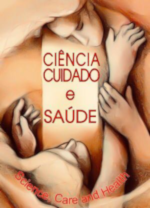Social representations of donors on human milk donation in a university hospital
Abstract
Objective: To know the social representations of donors about human milk donation in a university hospital. Method: This is a qualitative research using the Theory of Social Representations as a conceptual framework. For the qualitative analysis, the content analysis method was used. Results: Participants were thirty donors from a human milk bank in a public university hospital in southern Brazil. The themes related to donation that emerged from the speeches of these donors were: human milk bank: place of welcoming and learning; to donate breast milk: it takes work and requires commitment and being a donor is sharing what you have and helping those in need. Conclusion: The donation of human milk was related to the feeling of pride and sharing, with the family having an important role in this process. In addition, it was observed the importance of the welcoming and support received at the milk bank as a way to strengthen the bond between donor and institution and encourage such practice.
Downloads
References
Serafim D, Chow PL. O aleitamento materno na perspectiva do pai. Ciênc. cuid. Saúde. 2002; 1(1): 19-23. doi: http://dx.doi.org/10.4025/cienccuidsaude.v1i1.5635
Coutinho ACFP, Soares ACO, Fernandes PS. Conhecimento das mães sobre os benefícios do aleitamento materno à saúde da mulher. Rev enferm UFPE online. 2014; 8(5): 1213-1220. doi: 10.5205/reuol.5863-50531-1-ED.0805201415
Silva EBO, Capinan RC, Gomes DR, Mattos MP, Gomes DR, Mende ACCS. Benefícios do aleitamento materno no crescimento e desenvolvimento infantil: uma revisão sistemática. Revista das Ciências da Saúde do Oeste Baiano- Hígia [Internet]. 2016 [citado em 2019 fev]; 1(2):148-163. Disponível em: http://fasb.edu.br/revista/index.php/higia/article/view/125/131
Rocha LB, Araujo FMS, Rocha NCO, Almeida CD, Santos MO, Rocha CHR. Aleitamento materno na primeira hora de vida: uma revisão da literatura. Med. Saúde Brasília [Internet]. 2017 [citado em 2019 fev]; 6(3): 384-394. Disponível em: https://portalrevistas.ucb.br/index.php/rmsbr/article/view/8318/5490
Uema RTB, Tacla MTGM, Zani AV, Souza SNDH, Rossetto EG, Santos JCT. Insucesso na amamentação do prematuro: alegações da equipe. Semina Ciênc. Biol. Saúde. 2015; 36(1): 199-208. doi: http://dx.doi.org/10.5433/1679-0367.2015v36n1Suplp199
Quigley M, Henderson G, Anthony MY, McGuire W. Formula milk versus donor breast milk for feeding preterm or low birth weight infants. Cochrane Database Syst Rev 2014; 22(4): 1-12. doi: 10.1002/14651858.CD002971.pub2
Pittas TM, Dri CF. O diálogo entre saúde e política externa na cooperação brasileira em bancos de leite humano. Ciênc. Saúde Coletiva. 2017; 22(7): 2277-86. doi: http://dx.doi.org/10.1590/1413-81232017227.02832017
Secretaria Geral Ibero-americana Brasil. Programa ibero-americano de bancos de leito humano: iberBLH [Internet]. 2015 [acesso 2019 fev 14]. Disponível em: https://www.segib.org/pt-br/programa/programa-ibero-americano-de-rede-de-bancos-de-leite-humano/
Human Milk Banking Association of North America. Fild a Milk Bank [Internet]. 2016 [cited in 2019 fev 14] Available from: https://www.hmbana.org/locations
Australian Government, Department of Health. Donor human milk banking in Australia-Issues and Background Paper [Internet]. 2014. [cited in 2019 fev 14]. Available from: https://goo.gl/FQGhoM
Victora CG, Bahl R, Barros AJD, França GVA, Horton S, Krasevec J, et al. Breastfeeding in the 21st century: epidemiology, mechanisms, and lifelong effect. The Lancet, 387(10017), 475-490. doi: https://doi.org/10.1016/S0140-6736(15)01024-7
Moscovici S. Representações sociais: investigações em psicologia social. 11 ed. Petrópolis: Vozes; 2015. 1-408
Bardin L. Análise de conteúdo. Lisboa: Edições 70; 2016. 1-280
Miranda JOA, Serafim TC, Araújo RMA, Fonseca RMS, Pereira PF. Doação de leite humano: Investigação de fatores sociodemográficos e comportamentais de mulheres doadoras. RASBRAN [Internet]. 2017 [acesso 2019 fev 14];8 (1):10-7. Disponível em: https://www.rasbran.com.br/rasbran/article/view/475/152
Miranda WD, Passos MC, Freitas MIF, Bonolo PF. Representations of women milk donors on donations for the human milk bank. Cad. Saúde Colet. 2016; 24(2):139-44. doi: http://dx.doi.org/10.1590/1414-462X201600020029
Alves VH, Rodrigues DP, Branco MBLR, Souza RMP, Souza RRB, Medeiros FVA. Banco de leite humano na perspectiva da mulher doadora. Rev. Rene [Internet]. 2013 [acesso 2019 fev 14]; 14(6):1168- 76. Disponível em: http://repositorio.ufc.br/bitstream/riufc/11339/1/2013_art_vhaalves.pdf
Marinho TF, Alves VH, Branco MBLR, Rodrigues DP, Pereira RM, Marchiori GRS. Percepções valorativas de práticas em banco de leite humano. Cogitare enferm. 2017; 22(1):01-08. doi: http://dx.doi.org/10.5380/ce.v22i1.48679
Pellegrine JB, Koopmans FF, Pessanha HL, Rufino CG, Farias HPS. Educação popular em saúde: doação de leite humano em comunidade do Rio de Janeiro, Brasil. Interface Comun. Saúde Educ. 2014; 18(2):1499-1506. doi: http://dx.doi.org/10.1590/1807-57622013.0496
Corrêa MSM, Feliciano KVO, Pedrosa EN, Souza AI. Acolhimento no cuidado à saúde da mulher no puerpério. Cad. Saúde Pública. 2017; 33(3):01-12. doi: http://dx.doi.org/10.1590/0102-311x00136215
Moreira MA, Ribeiro OS, Ramos JSBM, Dias MBL, Castro JO. Representações sociais de mulheres migrantes da mesma família e de diferentes gerações sobre amamentação. Rev. enferm. UFSM. 2017; 7(4):669 – 684. doi: http://dx.doi.org/10.5902/2179769226544
Copyright (c) 2020 Ciência, Cuidado e Saúde

This work is licensed under a Creative Commons Attribution-NonCommercial 4.0 International License.





















